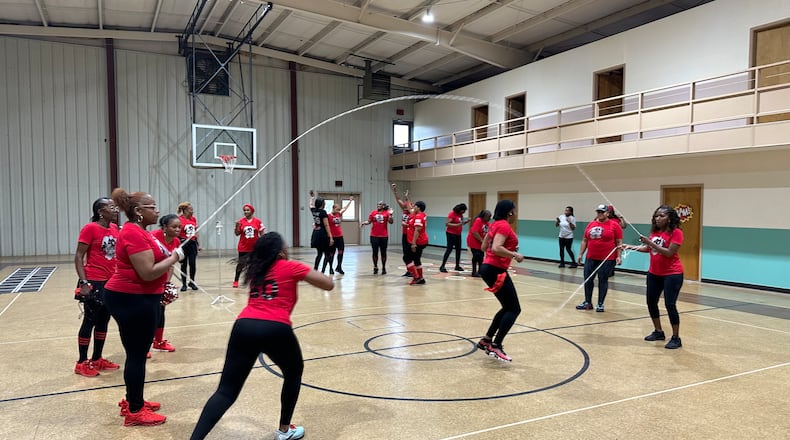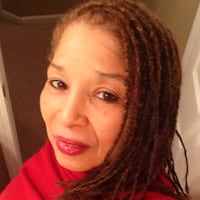On a recent warm, sunny Sunday afternoon about a hundred women in red and black T-shirts, shorts, and leggings packed the ball field at a high school in Douglasville. They gleefully jumped rope, hula-hooped, played hopscotch, line danced, and joined in on other nostalgic games from the playground.
Welcome to a 40-plus double Dutch club meetup where friendship, fun, fellowship, and sisterhood take center stage for about an hour and a half. No children or men allowed.
“I couldn’t wait to get here to fellowship with all the ladies,” said Tasha Finch, 47, of an April Douglasville meetup at New Manchester High School. “This is our play date when we get to leave everything behind for a little while and just have a good time.”
Since its inception in 2016 in a suburb of Chicago, the 40-plus double Dutch Club has morphed into a movement of more than 10,000 women strong throughout the United States and internationally, including in Canada and Germany, according to its founder, Pamela Robinson.
And the numbers are growing.
Most major U.S. cities have 40-plus double Dutch Club groups, called subclubs. Metro Atlanta has six: one each in Acworth, Decatur, Douglasville, Fayetteville, Forest Park and McDonough. The only requirement to join? Just be a woman over the age of 40.
The early days
Robinson and her co-founder Catrina Dyer-Taylor created the 40-plus double Dutch movement during a difficult time in Robinson’s life. Then 45, the stay-at-home mom was going through a divorce and was facing an empty nest. When Dyer-Taylor asked what would make her friend happy, Robinson responded that she wanted to jump double Dutch — like they did when they were kids.
Credit: Fran Jeffries
Credit: Fran Jeffries
“I was not trying to start a movement,” said Robinson during an earlier Atlanta visit. “I was just at a place in my life where I had lost myself. I needed to find a happy place.”
A handful of women showed up for the first meetup in Chicago in June 2016 and a movement was born. Then, after a 2019 appearance on a Chicago-area television show, the founders saw their Facebook group jump from 30 local women to 1,000 women nationwide. Today, that number is more than 60,000 Facebook followers, according to the organization’s website.
Continued growth
The focus on physical and emotional health attracted many members to 40-plus double Dutch. But it became about more than just jumping rope, members said.
Veronica Mayfield, co-captain of the Douglasville subclub, said her weekly meetups give her respite from her caregiving duties for her husband who had a stroke.
“The meetups help me get myself back on track. I needed to find out something that helped me. It was 40-plus double Dutch,” she said.
A constant refrain from members is that women come for the double Dutch but stay for the sisterhood.
Credit: Fran Jeffries
Credit: Fran Jeffries
Jumping double Dutch as a child “literally” saved Gena Golden’s life, said the 56-year-old Atlanta psychotherapist.
“Jumping was my escape from the violence in the streets” of Philadelphia, she said. Now she jumps regularly on Thursdays with the Forest Park subclub. Golden says she understands why women are attracted to the 40-plus movement. “Women tend to heal better in a community, in a collective.”
Members are welcome to participate in any subclub and are encouraged to visit other clubs in other cities when traveling.
A community affair
The organization is big on helping other women and women’s groups in the community by offering financial assistance, jumping lessons and performances.
There are no annual membership fees, or other fees to join. To be official, each year a member is asked to buy a T-shirt with the club logo on the front and her name and age on the back.
Weekly meetups follow the same format: Women sign in, then they stretch. Next comes open play, which is like recess at school. After that comes a series of line dances, followed by a cool-down dance called the Double Dutch Slide. Then a group picture is taken. Meetups always end with a circle prayer. Photos and videos are then posted to the subclubs’ Facebook group pages. There’s even a 40-plus double Dutch club jingle. It begins: “Jack be nimble, Jack be quick! We’re over 40 and tryna stay fit …”
Credit: Jamie Spaar
Credit: Jamie Spaar
Swan Fleming, captain of the Forest Park subclub, said she discovered the organization while scrolling through Facebook late one night. “I knew I had to be a part of it. I loved double Dutch as a teenager living in NY,” she said during her subclub’s one-year anniversary in October 2023. “I have met some great sister friends.”
Fleming says the meetups are part of her weekly self-care routine.
“Because I understand that as a woman in my 50s, I wear a lot of hats and I must fill my cup to be able to be there for myself, my husband, children, family and friends,” she said.
Some women are experiencing so much in their homes and their lives, Fleming said, so when they come out they can forget about adulting and their problems for a little while.
“I love hearing the laughs, seeing the smiles, and the women having so much fun during our weekly meetups and events.”
In double Dutch, a participant or participants jump in while two long jump ropes are turned in opposite directions. It can appear difficult for those who’ve never jumped. But that isn’t a factor for 40-plus members.
Fleming notes that women who join don’t have to know how to jump double Dutch.
“If you want to learn, we can teach you. If you just want to come for the fellowship with positive women you are welcome. No ‘Sister Left Behind’ is our motto and we live by it.”
For more information visit www.40plusdoubledutchclub.org
WATCH: “Behind the Ropes,” which is streaming on Tubi, is a documentary about how double Dutch can inspire women over 40 to discover new memories while reliving their childhoods.
About the Author
Keep Reading
The Latest
Featured






